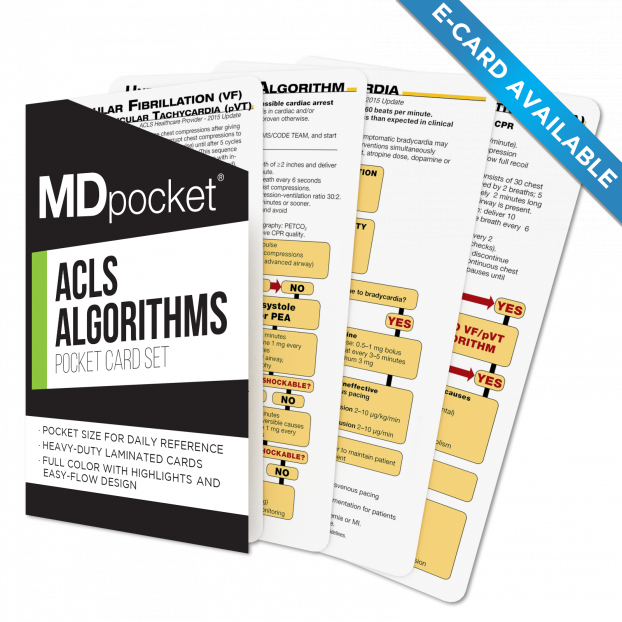
ACLS Reference Card Set
MDpocket 2021 ACLS pocket reference cards are ideal for quick review of the ACLS algorithms and are updated to the latest guidelines from the American Heart Association (AHA) for Cardiopulmonary Resuscitation (CPR) and Emergency Cardiovascular Care (ECC). These cards are used every day by healthcare providers throughout the United States and were first published in 1966. Since that time, periodic revisions of the ACLS guidelines have been published by the AHA with the latest guidelines from October 2020. MDpocket has compiled the AHA guidelines to provide a comprehensive review of evidence-based recommendations for resuscitation and emergency care with easy-flow algorithms to guide you through each critical situation. Our four-card six algorithm ACLS pocket reference set includes recommendations on ACLS pathways for treatments and algorithms for Pulseless Electrical Activity, Bradycardia, Pulseless Ventricular Tachycardia/Fibrillation, Asystole and ACLS medications. This set is great for studying the ACLS guidelines or having them available when you need it most.
2021 Updates
Enhanced algorithms and visual aids provide easy-to remember guidance for resuscitation scenarios.
• The importance of early initiation of CPR by lay rescuers re-emphasized.
• Previous recommendations about epinephrine early administration reaffirmed.
• Use of real-time audiovisual feedback is suggested as a means to maintain CPR quality.
• Continuously measuring arterial blood pressure and end tidal carbon dioxide (ETCO2) during ACLS resuscitation may be useful to improve the quality of CPR.
• Intravenous (IV) access is the preferred route of medication administration. Intraosseous (IO) access is acceptable if IV access is not available.
• Care of the patient after return of spontaneous circulation (ROSC) requires close attention to oxygenation, blood pressure control, evaluation for percutaneous coronary intervention, targeted temperature management, and multimodal neuroprognostication.
Circulation. 2020;142:S366–S468

All formats available:
Get this card as an eCard, a physical card or both! Just select the items you want in the ‘Options & Accessories’ section above.

Available anytime, anywhere:
Access your eCards using the MyHospital® App on your smartphone! All reference material can be accessed at anytime and anywhere with wifi or data!

Get your card instantly!:
Immediately after purchase your reference cards are available in the MyHospital® app on Android or IOS devices!
Make sure you get the perfect eReference material for you! Click here for our Medical Reference Guides!
Price in reward points: 999
ACLS Reference Card Set
MDpocket 2021 ACLS pocket reference cards are ideal for quick review of the ACLS algorithms and are updated to the latest guidelines from the American Heart Association (AHA) for Cardiopulmonary Resuscitation (CPR) and Emergency Cardiovascular Care (ECC). These cards are used every day by healthcare providers throughout the United States and were first published in 1966. Since that time, periodic revisions of the ACLS guidelines have been published by the AHA with the latest guidelines from October 2020. MDpocket has compiled the AHA guidelines to provide a comprehensive review of evidence-based recommendations for resuscitation and emergency care with easy-flow algorithms to guide you through each critical situation. Our four-card six algorithm ACLS pocket reference set includes recommendations on ACLS pathways for treatments and algorithms for Pulseless Electrical Activity, Bradycardia, Pulseless Ventricular Tachycardia/Fibrillation, Asystole and ACLS medications. This set is great for studying the ACLS guidelines or having them available when you need it most.
2021 Updates
Enhanced algorithms and visual aids provide easy-to remember guidance for resuscitation scenarios.
• The importance of early initiation of CPR by lay rescuers re-emphasized.
• Previous recommendations about epinephrine early administration reaffirmed.
• Use of real-time audiovisual feedback is suggested as a means to maintain CPR quality.
• Continuously measuring arterial blood pressure and end tidal carbon dioxide (ETCO2) during ACLS resuscitation may be useful to improve the quality of CPR.
• Intravenous (IV) access is the preferred route of medication administration. Intraosseous (IO) access is acceptable if IV access is not available.
• Care of the patient after return of spontaneous circulation (ROSC) requires close attention to oxygenation, blood pressure control, evaluation for percutaneous coronary intervention, targeted temperature management, and multimodal neuroprognostication.
Circulation. 2020;142:S366–S468

All formats available:
Get this card as an eCard, a physical card or both! Just select the items you want in the ‘Options & Accessories’ section above.

Available anytime, anywhere:
Access your eCards using the MyHospital® App on your smartphone! All reference material can be accessed at anytime and anywhere with wifi or data!

Get your card instantly!:
Immediately after purchase your reference cards are available in the MyHospital® app on Android or IOS devices!
Make sure you get the perfect eReference material for you! Click here for our Medical Reference Guides!
| Card | |
| Quantity | 4 Card Set |
| Size | 6" L x 3.75" W x 0.12" H |
| Weight | 0.10 lbs |
| Date | |
| Published | 1/14/2021 |
